Black, Feminist, & Bookish: How a Brooklyn Bookshop Brews an Intersectional Community
By: Janelle Cass, Megan DeAngelo, Jennifer Martin, Ellie Pasquale, and Annie Villamarin
Café Con Libros in Crown Heights, Brooklyn, catches the interest of the busy New York City public through the scent of rich coffee and pastries, as well as a colorful window display. Owner Kalima DeSuze curates a collection of literature that uplifts and empowers women’s voices from intersectional identities. As an Afro-Latinx woman, she is dedicated to sharing stories that reflect the intersectionality of the modern feminist movement.
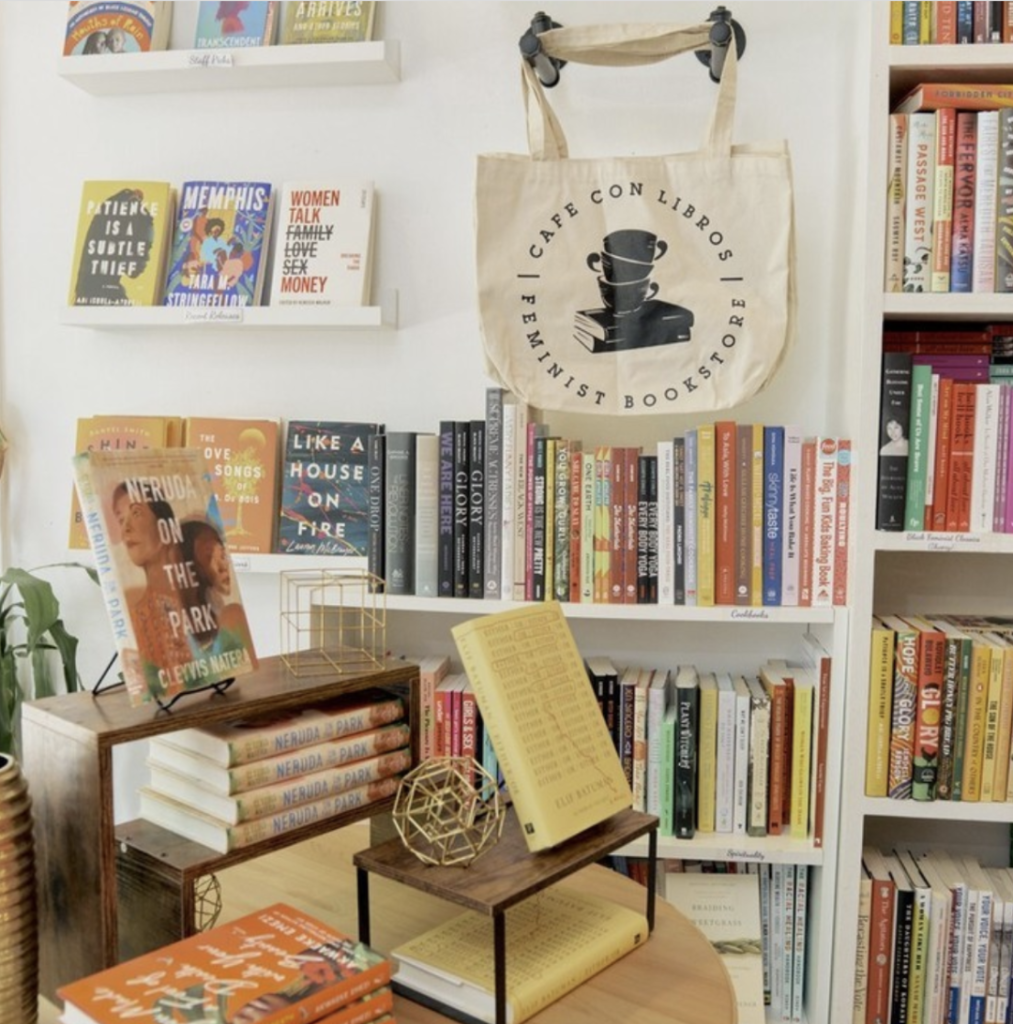
The emphasis on celebration and love is strong behind the doors of this intimate bookstore, where book clubs are held for titles written by or for feminists and women of color.
Its warm and cozy atmosphere is inviting and contagious, welcoming intersectionality and community into its quaint but open space. The creation of this bookshop has a story that may not be written in novel form, but it is shown through its location’s past, its efforts in the present to make feminist books more accessible, and all the possibilities it inspires for the future book-loving community.
Grounds for Resistance: The History of Crown Heights
Café Con Libros of Crown Heights, Brooklyn was founded in 2017 by social activist, new mother, teacher, and Afro-Latinx woman, Kalima Desuze. The location of Café con Libros was not chosen by chance but through DeSuze’s deep history with the area. She had been a resident of the area for most of her life, living with her Panamanian immigrant parents (Giwa). The actual building of Café con Libros was owned by a relative, Linda DeSuze, dating back to 1985, so it seemed only right to start this passion project in a community she had grown up in, where she knew what kind of bookstore it needed (NYC Dept.).
The population of Afro-Caribbean and Jewish families began long before DeSuze’s parents arrived, even before they were born. The settlement of the region began in the 1830s with two small villages founded by African Americans, called Weeksville and Carrville, where a large free Black population grew (Schaefer 350). When the villages were destroyed during the urbanization of the area in the late 1910s, Crown Heights became home to “an upwardly mobile, rapidly assimilating elite of Eastern European Jews and other White European immigrants” (Schaefer 350). Later, the population boomed in the 1940s and 1950s when a rush of Jewish and Afro-Caribbean immigrants joined the community, attracted to the country’s thriving wartime economy (Schaefer 350).
Crown Heights begins as a place for freed Black people in the United States, yet it turns into an intersectional neighborhood as time wears on, leading to some inevitable conflicts. On August 19, 1991, two African American cousins, Gavin and Angela Cato, were riding their bikes at the intersection of Utica Avenue and President Street—less than two miles away from where Café con Libros currently stands—when Orthodox Jewish Driver, Yosefl Lifsch, swerved onto the sidewalk. Gavin was killed and Angela survived, though she was severely injured. Rumors were spread that Lifsch was drunk driving, but they were later debunked, and the swerve was believed to have been deliberate.
A few hours later, a group of Black youths stabbed Yankel Rosenbaum, a visiting Orthodox Jew, and the stabbing was seen as a retaliation to the recent accident. Though he initially survived the stabbing, Rosenbaum died from bleeding in an undetected wound. Riots lasted anywhere from three to five days according to different sources, and homes, businesses, and vehicles were destroyed. Even before the riots, there was harboring resentment between the Black and Jewish communities in Crown Heights, because the Black residents believed that the Jewish residents had received special protection from law enforcement due to a police redistricting decision in 1976.
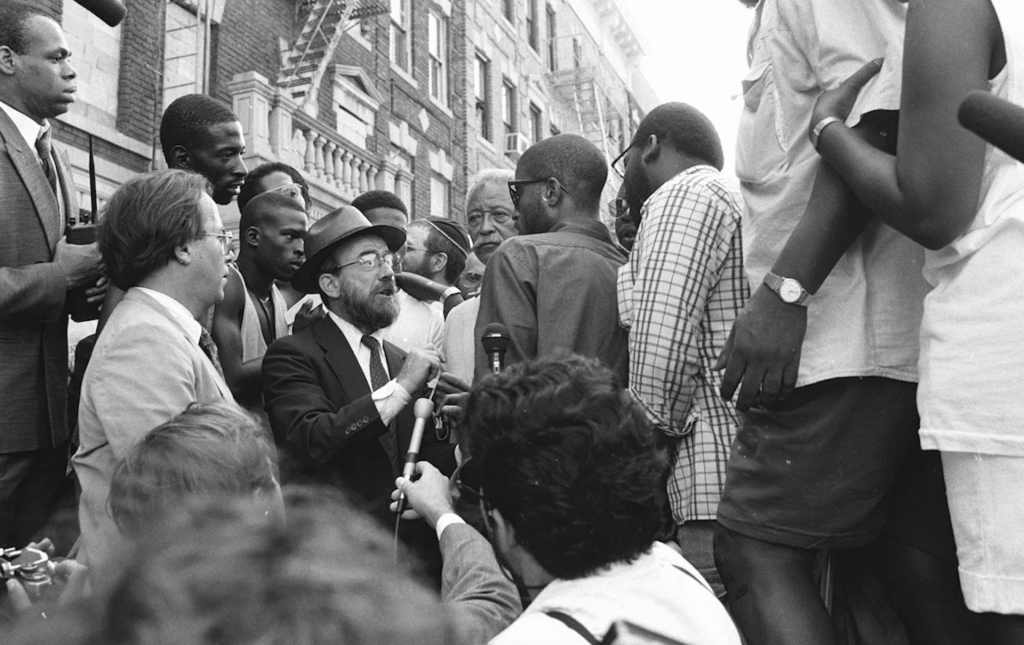
These riots were the result of two communities, both victims of oppression, wanting justice for their friends and family. Yet this shows the difficulties that can arise when intersectionality is not embraced but resisted. When Kalima DeSuze decided to open Café con Libros, it’s no mystery why she aimed to empower feminist and Afro-Latina voices. DeSuze is bringing to light intersectional identities that felt unseen and unheard in literature and Crown Heights. Daphne Spain expresses the importance of diverse female stories to the feminist movement in the 1970s, stating, “Feminist bookstores sustained and enriched the women’s movement when they disseminated literature by women of differing cultures, ethnicities, races, and sexual preferences” (89). This principle is still effective in the modern day through DeSuze’s bookshop. By creating a community dedicated to uplifting the writing and experiences of women of color, she is not only enriching the feminist movement but also enriching the neighborhood by embracing intersectional identities. She is actively creating a community for people like her, who felt so isolated in a neighborhood where identities are divided cleanly from one another by a history of violence and tension.
Timeline made by Megan DeAngelo using Time Graphics.
Order Up! How the Shop Serves Its Community Today
Café Con Libros is an intersectional feminist bookshop and café catered to, made for, and beloved by its Brooklyn neighborhood. There’s a homey and amicable sense of belonging emanating from its walls. As the Edinburgh academic Tim Cresswell describes in his book Place: A Short Introduction, “They [places] are all spaces which people have made meaningful. They are all spaces people are attached to in one way or another.” The patrons and employees of Café con Libros have certainly made the bookshop a meaningful place.
“Café Con Libros and its patrons have become one of my most cherished safe spaces. For a while now, I have been reckoning with shifts in friendships and craving community that shares my values. Café Con Libros and the WoC book club have satisfied that craving. Having the opportunity to engage in nuanced discussions about rich literature with other bookish folx has reminded me of the beauty and necessity of community.” -Melika Butcher
The spaces around the bookshop also contribute greatly to the community aspect of Café con Libros. Many are educational, including the Brooklyn Museum and the Children’s Brooklyn Museum, as well as several schools, encouraging children to visit the shop with their friends or guardians on their daily route. DeSuze takes care to recognize this by curating a special collection of children’s books for “budding feminists”.
Map created by Megan DeAngelo using Google My Maps. Red marks places of worship, green marks schools, purple marks the Children’s Museum, and blue marks Cafe Con Libros.
Of course, this isn’t to say that the Crown Heights area is the most ideal place. When you take a closer look at the community surrounding Café con Libros, it is easy to see the turmoil within it. The soft turquoise storefront stands on the frontlines of an uphill battle to unify an increasingly gentrified community.
Kalima DeSuze grew up a six-minute walk away from the shop, a place she says was once-crowded with old community convenience stores and African hair-braiding spots that have all since disappeared. Between 2000 and 2015, the Crown Heights area saw a 23% decrease in Black residents and a 205% increase in White residents (“Observer”). The median rent shot up from $870 to $1230, according to a study conducted by NYU’s Furman Center for Real Estate and Urban Policy. Gone is the mostly Black and low-income neighborhood she knew as a girl. In its place, a tense population divided by race and class now bustles around one another, unsure of how to make peace with and live together (“Fernández”).
Bookshops are a way for people to connect despite drastic changes in their community. Brooklyn is home to over 25 different bookshops, but Café con Libros makes a bold stand from the rest. All thanks to Kalima DeSuze’s extraordinary community work.
Along with running the bookshop, DeSuze is a social worker, a professor of social work, and an anti-racist community organizer, which she says greatly impacts every decision she makes about the shop. She carefully picks every aspect of the bookshop to cater to the feeling of acceptance and freedom within this community. The titles, events, and authors are handpicked to cater to this community. Even the name of the bookshop is an homage to DeSuze’s Afro-Latina roots, a nod to café con leche.
Not only is DeSuze creating a space for this community, but she is also reclaiming the place of the café. DeSuze explains in an interview with Black-Owned Brooklyn that, “A café is the number one marker of gentrification in most communities of color, and I’ve had to wrestle with that and how people view me. Sometimes people will walk right past because they don’t believe the space is for them, and this is so incredibly painful.”
In her book Reluctant Capitalists: Bookselling and the Culture of Competition, Laura J. Miller writes about what exactly community is and how it works within a grander scheme of things, “Community implies social bonds based on affective ties and mutual support […]” (119). Above all else, Café con Libros is a bookshop for the Black, intersectional feminist community, providing support and connection.
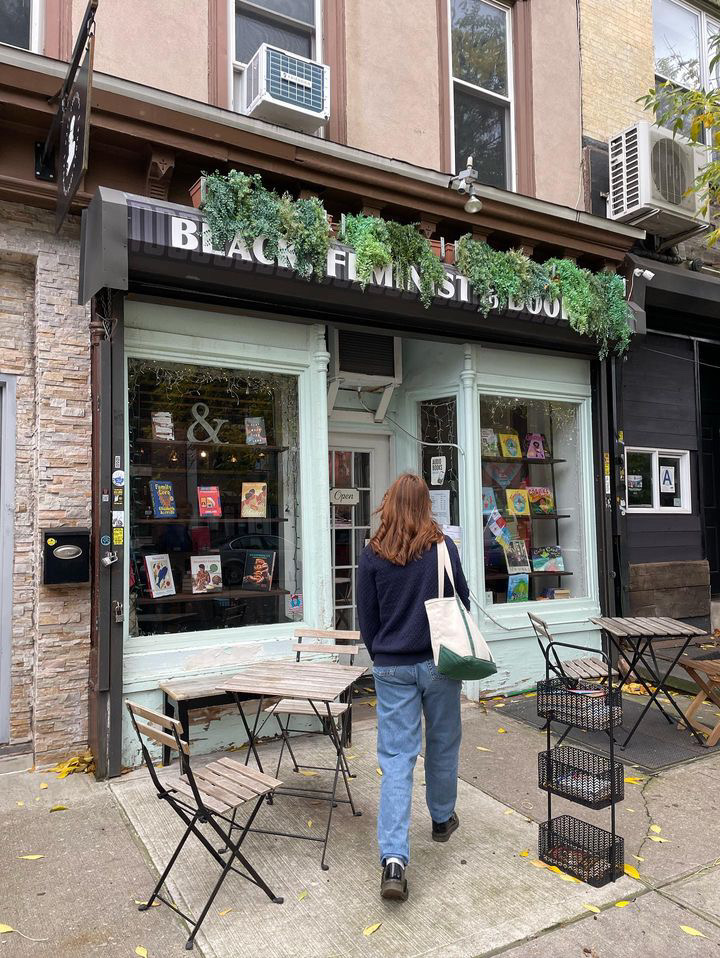
Café con Libros is perhaps the most dedicated business to fostering and engaging with the community that most people have ever seen. Between their locally sourced pastries, their multiple book clubs, and their events that uplift other small businesses in Brooklyn, womxn authors, and cultural events, Café con Libros is determined to make themselves a meaningful place to anyone who walks through their doors.
An Open Space and An Open Mind: Small Space for a Big Community
Tucked behind a cozy curtain of sage, forest, seafoam, and bottle-green ivy hangs a stark black and white awning. “BLACK, FEMINIST, & BOOKISH” it reads — but only on weeks that follow a good hedge trimming. That’s okay, though. The locals that frequent the shop already know what it says. A pride flag, as well as the flag of Panama — where the owner Kalima DeSuze hails from — proudly hang side by side in the window.
The layout of the shop feels like an attempt at bridging a connection between the turbulent past and the relentlessly hopeful present of the surrounding neighborhood. The open layout acts as a metaphor for openness, serving as a peace offering and a neutral ground for a once-divided community to come together and share stories.
Readers will quickly take notice of DeSuze’s effort to disprove the misconception that feminism is only for “white folk” (Fernández). The left-hand window features books like The Crunk Feminist Collection and The Misadventures of Awkward Black Girl by Issa Rae. Beside them stand My Broken Language: A Memoir by Quiara Alegría Hudes and Las Madres by Esmeralda Santiago.
The wooden shelves in the right window display an extensive collection of diverse children’s books. There are titles such as La Guitarrista by Lucky Diaz, illustrated by Micah Player, and Los coquíes aún cantan by Karina Nichole González, illustrated by Krystal Quiles.
Books written in Spanish as well as English reiterate this mission of intersectionality and reflect the rich ethnic make-up of their New York area. The collection also showcases DeSuze’s multifaceted desire to challenge her Afro-Latinx community’s views on feminism by mirroring their experiences and giving them a reason to feel a part of the shop’s narrative. As her neighborhood continues to grow and change, she doesn’t want her shop to be limiting or divisive. She wants it to be unifying.
Floor plan made by Jennifer Martin using ThingLink.
The sunlight from the nearly floor-to-ceiling-sized windows brightens the hardwood of the small, one-room shop and illuminates the white shelves, which are piled high with black, queer, feminist, and classic literature. Trendy cream-colored tote bags decorate exposed, old-fashioned brick walls.
Lyndsie Manusos from BookRiot points out that lighting has become an increasingly important part of nailing down a bookshop’s sense of design. Café con Libros has certainly paid special attention to the “vibe” in their shop in this regard. The natural lighting not only creates space, but also an inviting place for folks to browse books while sipping a coffee. This reflects Café con Libros’ mission of being a community space where people would want to stop by and hang out.
A small circular table sits to the immediate right of the door, highlighting books from local writers in a popular “customer-facing” design that Manusos also calls modern, eye-stopping, and customer-first (Manusos). Small shelves by the window display staff-picked books for another anchoring touch of community. A bundle of tote bags hangs on a rustic rail beside it.
The remainder of the right wall is an impressively large bookcase that displays Café Con Libros’ main collection. Tiny tags with elegant, cursive script denote the shelves with hyper-specific genres and age categories. From left to right, the inventory covers cookbooks, spirituality, and healing before moving into fiction like “LGBTQIA+ literature,” “Queer Romance,” “Asian Diaspora,” “Indigenous Writing,” “Young Adult,” “Latina Reads,” “Science Fiction and Fantasy,” “Graphic Novels,” and “Young Adult,” just to name a few. There are even “not-book” items like little embroidered signs and metal figurines that make the shelves feel homey, just as the writer Lydia Pyne describes in BookShelf. It is a way to “declare one’s identity and individuality” (23 Pyne). Café con Libros holds over two hundred books and each one is handpicked by Kalima DeSuze herself (Best of Brooklyn). The wall feels like a personal collection.
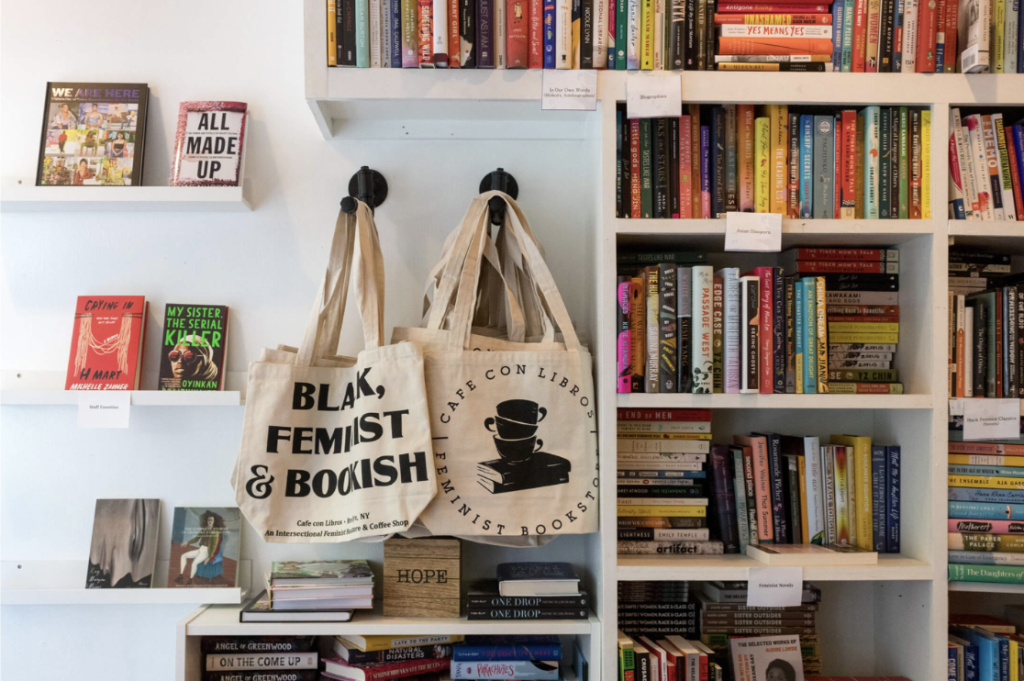
The right wall of Cafe Con Libros, featuring the store’s main collection. Image above taken by Susan De Vries. Image to the right is from Kelsey F. on Yelp.
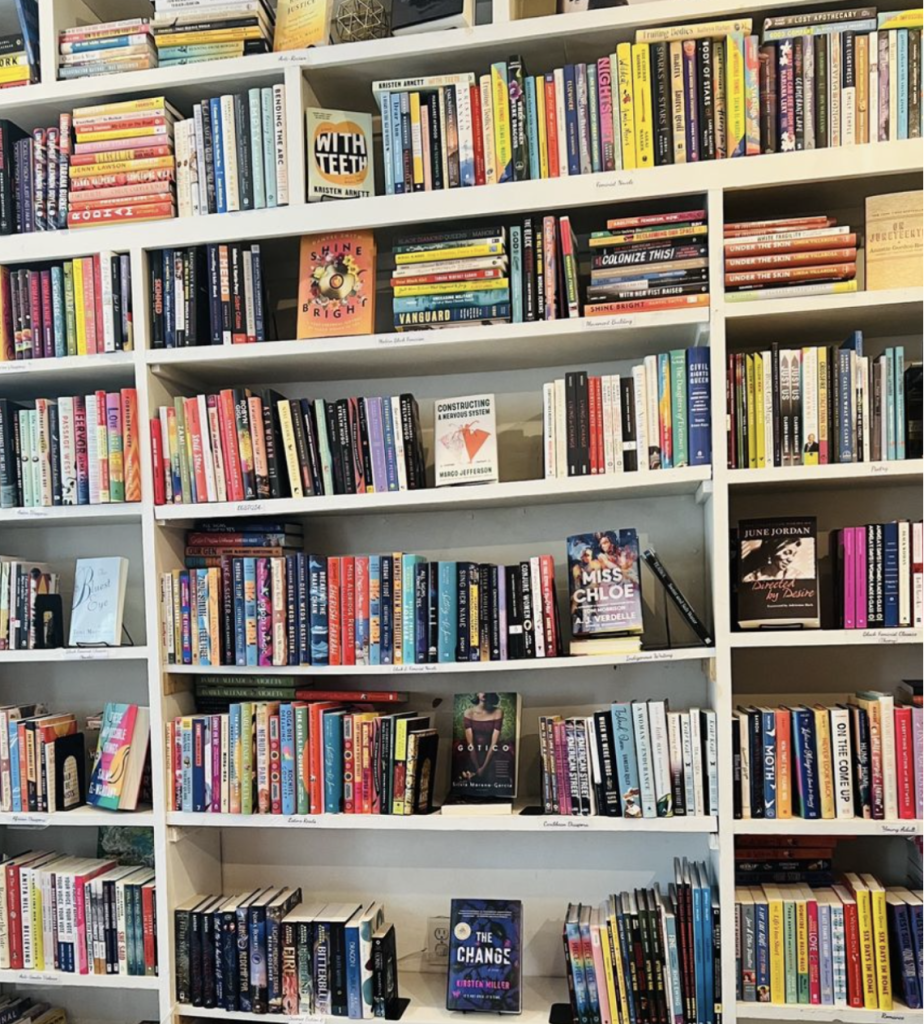
As the academic Daphne Spain argues in her study of Feminist Bookstores, women visit feminist bookstores specifically “to see themselves in the books, and the ways books were displayed simplified their search. It was important to stock books by and about African American and Latina women, and equally important to make those collections visible” (88 Spain). According to Café Con Libros’ website, the shop aims to “offer feminist texts for all personalities, political affiliations, temperaments, and tastes.” Their selection means to “represent as many identities as possible.” The abundance of hyper-specific genres captures this intention.
Understandably, the black feminist classics are front and center. Kalima DeSuze’s favorite book, Toni Morrison’s The Bluest Eye, is always faced out to customers (Abi). Shelf tags like “Modern Black Feminism” and “Black Feminist Classics” have the largest collections, and establish the shop as a landmark location for black feminist book-lovers.
The entire top shelf of the bookcase, miscellaneously marked “Feminist Novels,” continues off the right wall and onto the back wall as well, right above the coffee bar, which takes up the entire back right-hand corner of the shop.
Their tiny cafe has a rustic yet simultaneously hip and minimalist aesthetic. Mugs hang from the walls, dark umber wood coats the countertop, and a small iPad sits in the place of a traditional register. Coffee is cheap, their largest latte only costing $4, but criminally delicious.
Continuing through the store clockwise, customers travel from womanhood to girlhood. A sign reading “It’s a girl’s world” to the right of the bar marks the threshold of this new portion of the shop: the children’s section, or the place Café Con Libros affectionately reserves for their “baby, budding feminists” (“Café Con Libros”).
This expanse of wall carries colorful toys, puzzles, and stuffies, as well as an entire bookcase of picture and board books. The tags in this section vary from age categories like “Baby” to genre-specific ones like “LGBTQIA+” and “Civil Rights.” There’s a round table at the end of this wall, symmetrical to the other half of the shop, that features children’s books written by local authors.
Unlike objects in a museum that often require plaques for historical context and meaning, the objects of a bookshop speak for themselves. They carry their own narrative. She doesn’t insist that all women are the same, but builds a library of all the ways they are different. DeSuze makes a reason to celebrate it, placing them all together in the same bookcase in the same shop. She resists the sort of other-ing and separatism that first poisoned her neighborhood.
The design of the shop feels modern, yet historic. Young, yet timeless. To circle the quaint space feels like an invitation to travel both forward and backward in time, to touch and listen to literary objects as they speak their stories, to find the intersection between books penned by and for women of all different bodies, beliefs, and backgrounds.
Closing the Book: A Reflection on Café Con Libros
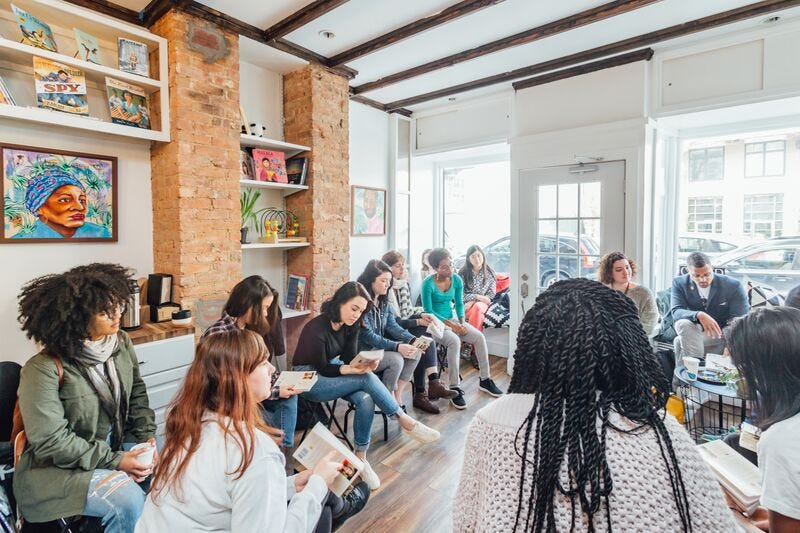
Café con Libros curates a book-loving community that thrives on intersectionality and celebration of culture in a city full of it. The rich history of Crown Heights emphasizes the need for an open space where all are invited to learn and grow from one another’s experiences. Kalima DeSuze runs with this mission in the shop today — developing and adapting new programs and ideas to reach more people within her community, from a podcast she started during the pandemic to a book subscription service she launched this year. The layout only strengthens this narrative with shelves dedicated to different diasporas and an open floor that encourages gathering and can be easily converted into a hub for local events.
Trailer for “Black Feminist & Bookish,” a podcast made by Cafe Con Libros.
DeSuze is ultimately a community builder. All are invited to spend an afternoon in the cozy space of Café Con Libros, bumping elbows at book clubs while sipping their warm mugs of coffee and cracking open the spine of a new paperback. She designed Café Con Libros to not only be a mirror for the community’s past, but also a window to see its future.
Text Citations
“10 Best Cafes in Crown Heights.” Your Brooklyn Guide, 13 June 2022, yourbrooklynguide.com/cafes-in-crown-heights/.
“Brooklyn Borough, Kings County, NY.” Census Reporter, censusreporter.org/profiles/06000US3604710022-brooklyn-borough-kings-county-ny/. Accessed 18 Sept. 2023.
“Cafe Con Libros.” Black-Owned Brooklyn, 1 Mar. 2018, www.blackownedbrooklyn.com/stories/cafe-con-libros.
“Cafe Con Libros.” Cafe Con Libros, 2018, www.cafeconlibrosbk.com/.
Cresswell, Tim. “Defining Place.” Place: An Introduction, 2013, p 7.
Fernandez, Stacey. “This Afro-Latina’s Feminist Bookstore Is Building Community in Gentrifying Crown Heights.” Remezcla, 10 Mar. 2018, remezcla.com/features/culture/this-afro-latinas-feminist-bookstore-is-building-community-in-gentrifying-crown-heights/.
Giwa, Cynthia. “Cafe Con Libros.” Black-Owned Brooklyn, 1 Mar. 2018, www.blackownedbrooklyn.com/stories/cafe-con-libros.
Manusos, Lyndsie. “The Science and Recent History of Bookstore Design.” Book Riot, 22 Feb. 2022, bookriot.com/the-science-and-recent-history-of-bookstore-design/.
“Menu: Cafe Con Libros.” Cafe Con Libros, www.cafeconlibrosbk.com/menu. Accessed 1 Nov. 2023.
Miller, Laura J. “Serving the Entertained Consumer.” Reluctant Capitalists: Bookselling and the Culture of Consumption, 2007, p. 119.
NYC Department of Finance, Office of the City Register. Deed to 724 Prospect Place. Automated City Register Information System, 5 December 1985, https://a836-acris.nyc.gov/DS/DocumentSearch/DocumentDetail?doc_id=FT_3010009032901.
Pyne, Lydia. Bookshelf. Bloomsbury Academic, 2019.
Schaefer, Richard T. Encyclopedia of Race, Ethnicity, and Society. SAGE, 2008.
Spain, Daphne. “Feminist Bookstores: Building Identity.” Constructive Feminism: Women’s Spaces and Women’s Rights in the American City, Cornell University Press, 2016, pp. 84-110.
Staff, Bklyner. “What Does the New Census Data Tell Us About Brooklyn?” Bklyner, 13 Aug. 2021, bklyner.com/brooklyn-census-2020/. Stout, David. “The Case That Rocked Crown Heights.” The New York Times, The New York Times, 15 Aug. 1996, www.nytimes.com/1996/08/15/nyregion/the-case-that-rocked-crown-heights.html.
Image, Video, and Audio Citations
Black Feminist & Bookish. “Black Feminist & Bookish.” Spotify.
Cafe con Libros. @cafeconlibros_bk. Instagram. https://www.instagram.com/cafeconlibros_bk/
“Portraits by Chris Setter.” NYC Photographer Chris Setter, www.chrissetter.com/. Accessed 18 Sept. 2023.
F., Kelsey. Yelp. https://www.yelp.com/user_details?userid=nL8Ub9QbzrSqWY0LlJMxpA. Accessed 1 Nov. 2020
“The Alliance Between America’s Black and Jewish Activists Has Long Been Troubled” by Arica Coleman, 22 Aug. 2016. TIME, https://time.com/4460730/crown-heights-anniversary-blm-platform/.

0 Comments